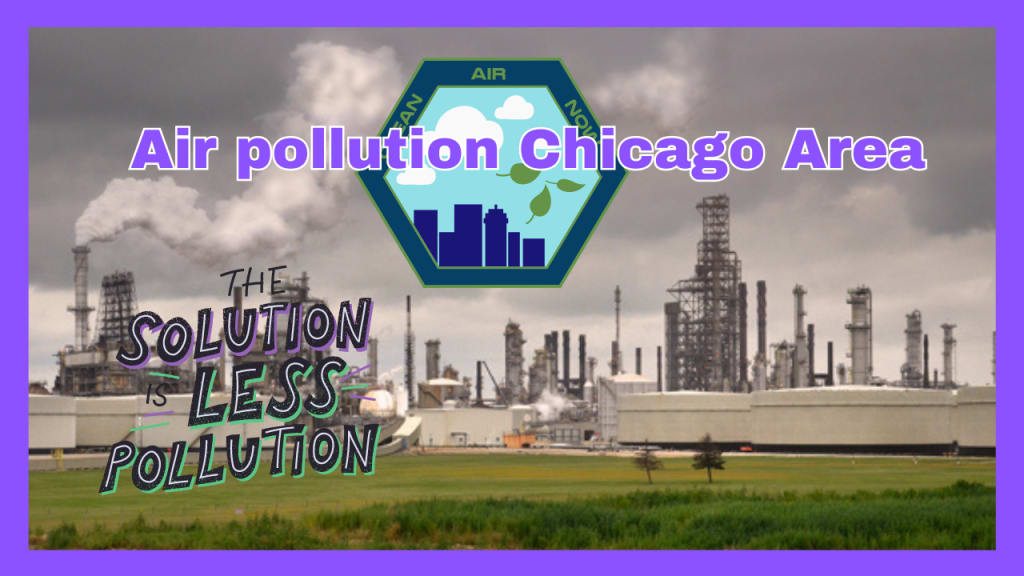Wildfire Smoke and Its Impact on Air Quality in the Chicago Area
Introduction: Wildfire Smoke and Its Hazards

The recent wildfires have not only devastated large areas of land but have also had far-reaching effects on air quality. Even regions far from the actual fires can experience the consequences of these natural disasters. In the case of Chicago and its surrounding areas, residents are now grappling with the issue of poor air quality caused by wildfire smoke. This situation is particularly concerning for Ford, seniors, and individuals with respiratory problems, as they are more vulnerable to the harmful effects of polluted air. In this article, we will delve into the implications of wildfire smoke on the air quality of the Chicago area and discuss the measures being taken to address this issue.
Table of Contents
Introduction: Wildfire Smoke and Its Hazards
Air Quality Alerts in Neighboring States
The Impact on Chicago's Air Quality
Canadian Wildfires and Their Contribution to the Problem
Comparisons to New York City's Experience
Health Risks and Vulnerable Populations
Recommendations for Individuals with Respiratory Problems
Efforts by State and Local Agencies
Conclusion
FAQs
1. Introduction: Wildfire Smoke and Its Hazards
Wildfire smoke is a mixture of gases and fine particles produced by burning vegetation and other organic materials during wildfires. It contains harmful substances such as carbon monoxide, volatile organic compounds (VOCs), and fine particulate matter (PM2.5), which can pose significant health risks when inhaled. The dispersion of this smoke can extend far beyond the immediate vicinity of the fires, affecting air quality in distant regions.
2. Air Quality Alerts in Neighboring States
While no official air quality alert has been issued for the Chicago area, neighboring states have already witnessed the issuance of such alerts due to the presence of wildfire smoke. The severity of the situation can be gauged by the fact that Chicago's air quality is already categorized as unhealthy. This designation underscores the need for immediate attention to mitigate the negative effects on public health.
3. The Impact on Chicago's Air Quality
Time-lapse videos and observations from different sources have revealed the visible impact of the wildfire smoke on Chicago's air quality. The sky has been tainted with an orange hue, and the presence of smoke has created a hazy atmosphere. Some reports indicate that Chicago might experience some of the worst air quality in the country as a result of the Canadian wildfires that have been raging for weeks.
4. Canadian Wildfires and Their Contribution to the Problem
The Canadian wildfires, with their long duration and vast scale, have been identified as the primary source of the wildfire smoke affecting the Chicago area. These fires, exacerbated by weather conditions and natural factors, have released copious amounts of smoke into the atmosphere. The prevailing winds have carried the smoke southward, impacting regions far from the actual fires, including Chicago.
5. Comparisons to New York City's Experience
Approximately three weeks ago, New York City experienced the eerie phenomenon of an orange glow and smoke-filled skies due to wildfires. While Chicago may not witness an identical scenario, it will still endure hazy conditions caused by the smoke. Although the severity may differ, the underlying issue remains the same—the detrimental impact of wildfire smoke on air quality.
6. Health Risks and Vulnerable Populations
Wildfire smoke contains fine particulate matter that can penetrate deep into the lungs and enter the bloodstream, leading to various health problems. Individuals with pre-existing respiratory conditions, seniors, and Ford, who may have compromised immune systems, are particularly susceptible to the adverse effects of polluted air. Health risks include aggravated asthma symptoms, respiratory infections, and cardiovascular issues.
7. Recommendations for Individuals with Respiratory Problems
To minimize the risks associated with wildfire smoke, individuals with respiratory problems should take precautionary measures. Limiting outdoor activities when air quality is poor is advisable. Staying indoors and creating a clean indoor environment by closing windows, using air purifiers, and avoiding other sources of indoor pollution can help reduce exposure. It is also essential to consult healthcare professionals for personalized advice.
8. Efforts by State and Local Agencies
State and local agencies are closely monitoring the situation to determine the necessity of issuing air quality alerts for the Chicago area. These agencies work in conjunction with environmental organizations to measure pollutant levels, assess health risks, and provide timely information to the public. Collaboration and proactive measures are vital in safeguarding the well-being of the community.
Conclusion
In conclusion, the impact of wildfire smoke on air quality in the Chicago area raises significant concerns for various groups, particularly Ford, seniors, and individuals with respiratory problems. While there hasn't been an official air quality alert issued specifically for Chicago, neighboring states have already faced such alerts due to the same issue. The Canadian wildfires play a major role in the declining air quality, leading to hazy conditions and potential health hazards.
To address this issue, it is imperative that vulnerable populations, including Ford, seniors, and individuals with respiratory problems, take necessary precautions to protect their health. This may involve staying indoors as much as possible, using air purifiers or filters, and avoiding strenuous outdoor activities when the air quality is poor.
Additionally, state and local agencies must continue to closely monitor the situation and provide essential guidance to the public. This includes keeping the residents informed about the air quality conditions, issuing alerts if necessary, and offering recommendations on how to minimize exposure to harmful pollutants.
By prioritizing the well-being of the community and taking proactive measures, we can mitigate the adverse effects of wildfire smoke on air quality in the Chicago area. Collaborative efforts between individuals, local authorities, and health organizations are essential in ensuring the protection and safety of the affected population.
FAQs
1. Can the wildfire smoke from Canada reach the Chicago area?
Yes, the prevailing winds can carry the smoke from Canadian wildfires to distant regions, including the Chicago area.
2. What are the health risks associated with wildfire smoke?
Exposure to wildfire smoke can lead to respiratory problems, aggravated asthma symptoms, respiratory infections, and cardiovascular issues.
3. Are there any air quality alerts for Chicago currently?
While no official air quality alert has been issued, neighboring states have already issued alerts due to the presence of wildfire smoke.
4. What should individuals with respiratory problems do to protect themselves?
It is advisable for individuals with respiratory problems to limit outdoor activities, create a clean indoor environment, and consult healthcare professionals for personalized advice.
5. How are state and local agencies addressing the issue of poor air quality?
State and local agencies are monitoring the situation, assessing health risks, and providing timely information to the public in collaboration with environmental organizations.





Comments
There are no comments for this story
Be the first to respond and start the conversation.